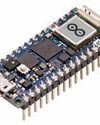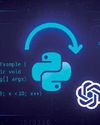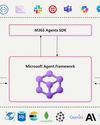試す 金 - 無料
From Virtual Machines to Docker Containers: The Evolution of Software Development
Open Source For You
|November 2024
Containerisation and Kubernetes have eased software development, making it faster and better. Let's see where these are headed, looking at trends that are making life easier for developers.

Whether we’re using a banking app or watching videos, we expect all software applications to run smoothly, no matter what device or platform we use. Technologies like virtualisation and containers, and orchestration tools such as Docker and Kubernetes have restructured how applications are built, tested, and deployed. They make it easier for developers to create and run software consistently across different environments.
In the past, software development faced a lot of challenges—compatibility issues, scaling problems, and time-consuming deployment. These old methods often led to the well-known phrase, “it works on my machine,” when software didn’t behave the same way in different environments. As applications grew more complex with many dependencies and varying setups, finding more reliable solutions became essential.
Virtualisation, introduced in the 1960s, revolutionised computing by enabling multiple operating systems to run on a single machine. In the 2000s, containerisation was a significant development, with tools like Linux containers (LXC). The concept gained widespread attention with the launch of Docker in 2013, which made containerisation easier and more accessible for developers. Docker made it easy for developers to bundle applications and their requirements into portable containers. This allowed isolated environments to be easily deployed anywhere, cutting down the overhead that came with traditional virtual machines. Building on Docker’s success, Kubernetes arrived in 2014, created by Google to meet the need for managing containers at scale. With Kubernetes, developers gained powerful tools for automating the deployment, scaling, and management of applications, making software development even more efficient.
このストーリーは、Open Source For You の November 2024 版からのものです。
Magzter GOLD を購読すると、厳選された何千ものプレミアム記事や、10,000 以上の雑誌や新聞にアクセスできます。
すでに購読者ですか? サインイン
Open Source For You からのその他のストーリー

Open Source For You
The Role of Open Source in Building Modern Data Infrastructure
It's no secret that open source is emerging as the backbone of modern data infrastructure. Here’s a list of the core open source technologies used to deploy this infrastructure, along with some real-world examples and a brief on why open source matters.
3 mins
December 2025

Open Source For You
The Whispering Machines: How Open Source is Bringing Intelligence to the Tiniest Devices
Built on open source frameworks, TinyML is enabling complex machine learning models to run on the microcontrollers embedded in connected devices, bringing artificial intelligence to the very edge of the network.
3 mins
December 2025

Open Source For You
Setting Up Snort to Secure Your Network
Snort is a popular, open source intrusion detection system that monitors traffic in real time to detect malware. Here’s a detailed explanation of how to set it up on Ubuntu and test it by generating traffic from another system.
7 mins
December 2025

Open Source For You
When AI Meets DevOps to Build Self-Healing Systems
Traditional DevOps, with its rule-based automation, is struggling to work effectively in today’s complex tech world. But when combined with AlOps, it can lead to IT systems that predict failures and solve issues without human intervention.
7 mins
December 2025

Open Source For You
How to Automate Java Code Modernisation
This short guide illustrates that automating Java code modernisation with Python and OpenAI API is not just possible-it's remarkably effective.
5 mins
December 2025

Open Source For You
The Quest to Build a Quantum Computer
The road to large-scale quantum computing is long and hard, with incremental advances paving the way. But the destination is in sight.
12 mins
December 2025

Open Source For You
Job Opportunities: What's Hot in the Cloud Space?
If there's one field that refuses to slow down, it's cloud computing. Even as automation and AI reshape roles, cloud adoption continues to surge. From startups deploying microservices overnight to enterprises migrating decades of legacy systems, cloud remains the engine of digital transformation. For professionals, this means one thing: skills that live in the cloud won't come down anytime soon.
2 mins
December 2025

Open Source For You
Securing Client Identity with Post-Quantum Cryptography
Here's a quick tutorial on how to build a secure, real world client-server model that establishes client identity by using CRYSTALS-Dilithium, a post-quantum cryptography algorithm.
3 mins
December 2025

Open Source For You
Unlocking the Power of Multi-Agent Solutions with the Microsoft Agentic Framework
The Microsoft Agentic Framework is rapidly emerging as a cornerstone for developers, architects, and technology leaders seeking to build dynamic, intelligent systems powered by multiple collaborating agents. In an era where automation, distributed intelligence, and adaptive software are increasingly vital, this framework offers robust tools and features to accelerate the design and deployment of agent-based solutions.
6 mins
December 2025

Open Source For You
Apache Iceberg and Trino: Powering Data Lakehouse Architecture
Apache Iceberg is a cornerstone of any open data lakehouse, providing the transactional foundation upon which highly scalable and flexible analytics can flourish. Along with Trino, it can be used to build a robust, scalable, and high-performance data lakehouse.
4 mins
December 2025
Listen
Translate
Change font size
